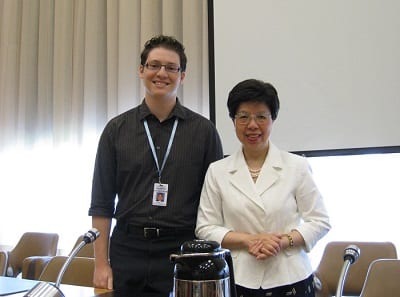“My research focuses on crafting strategies through which countries can work together to address transnational health threats. The classic example of a transnational health threat is a pandemic. Viruses and bacteria don’t carry passports – they’re not easily contained, no matter how big a wall we might want to build. Much of our health is determined by decisions and circumstances that are taking place around the world. If governments are serious about trying to advance the health of their citizens, they need to work together to address the increasing number of health threats that transcend national borders.
There are so many risks we face today that don’t respect borders: climate change, air pollution, water quality, migration, conflict, for example. We need to make sure we are able to achieve global collective action and design strategies that will enable countries to work together. It isn’t easy.
My research is motivated by the idea that we already have technical solutions to address many health challenges, yet progress remains frustratingly slow because we don’t know how to fully implement them. We know what it takes to live a healthy, long life, and we have treatments for many diseases. But, not everyone in the world has been able to benefit from those technologies or live in healthy conditions. As a result, there is an implementation gap. Some people might just blame it on “politics”. Our research program – the Global Strategy Lab – is focused on looking deeper, understanding these political complexities, and then designing strategies that will work in practice.
How do we embrace the fact that health is political?
How do we conduct research that informs the kind of solutions that will reach everybody around the world, particularly the most marginalized among us?

Professor Steven J. Hoffman with WHO Director-General Margaret Chan. Photo taken on July 4, 2008
As a student, I had the opportunity to do an internship at the World Health Organization’s headquarters in Geneva. During my first week as an intern, there was a meeting of the WHO Executive Board. There were 34 members sitting around the table discussing budgets: thirty-two members voted to increase the budget; the United States and Australia voted against it. They were arguing, and I remember thinking – 32 vote “yes”, two vote “no”, it’s simple math on who would win the vote. The WHO Executive Board members took a break and when they returned it was a consensus – no budget increase. At the time I thought: ‘That’s not how democracy works.’ But then my next thought was ‘I am so naïve.’ So I went to law school to figure out what happened. Now I know.
What this anecdote highlights is that the way we try to improve health often happens through decisions or actions that many of us don’t see or fully understand. In global health discussions, very often the focus is on finding technological silver bullet solutions to problems such as vaccines, medicines and fancy AI-powered mobile apps. I like technology like everyone, but it’s only the start of the solution. Technologies must be implemented, which require a deep understanding of politics, law, economics, ethics and the full range of social sciences. This is where I focus my attention.
Our research at the Global Strategy Lab has informed the policies of national governments and international institutions on a myriad of topics. What excites me is that evidence-based ideas can change the world. Through our efforts, we’ve been able to inform policies that have been adopted and made a real impact in communities around the world. Seeing our research taken up by national and global policymakers is a great motivator to continue doing the hard work needed in this area.
At the Global Strategy Lab, we have developed a relatively unique specialization at the intersection of international law and epidemiology. I use my legal background and my epidemiologic toolbox in order to unpack not only the different policies and laws affecting health, but also the way that new policies and laws can be designed in order to improve health.
I feel very lucky to be at York, where these kind of interdisciplinary approaches are not only accepted, but celebrated. When we are focused on policy change, there is a great amount of impact that can be achieved by working at the intersection of disciplines – which is where the Global Strategy Lab excels. It has been really satisfying to break down boundaries and carve out these new spaces where so much innovation can take place.” - Steven J. Hoffman
Dr. Steven J. Hoffman is the Dahdaleh Distinguished Chair in Global Governance & Legal Epidemiology and a Professor of Global Health, Law, and Political Science at York University, the Director of the Global Strategy Lab, the Director of the WHO Collaborating Centre on Global Governance of Antimicrobial Resistance, and the Scientific Director of the CIHR Institute of Population & Public Health at the Canadian Institutes of Health Research. He is an international lawyer licensed in both Ontario and New York who specializes in global health law, global governance and institutional design. His research leverages various methodological approaches to craft global strategies that better address transnational health threats and social inequalities. Past studies have focused on access to medicines, antimicrobial resistance, health misinformation, pandemics and tobacco control.
